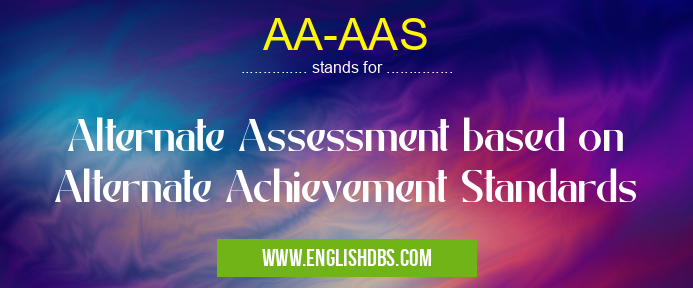What does AA-AAS mean in EDUCATIONAL
Alternate Assessment based on Alternate Achievement Standards, or AA-AAS for short, is a testing system specifically designed to accurately measure the academic achievement of those students in special education who demonstrate extremely low academic performance and have significant cognitive disabilities. This type of assessment has been in use since 2005 when it was mandated by the Individuals with Disabilities Education Improvement Act (IDEA). Since then, an increasing number of schools and districts are recognizing the value of this type of assessment in helping educators identify individual strengths and weaknesses in order to tailor educational interventions to meet the unique needs of each student.

AA-AAS meaning in Educational in Community
AA-AAS mostly used in an acronym Educational in Category Community that means Alternate Assessment based on Alternate Achievement Standards
Shorthand: AA-AAS,
Full Form: Alternate Assessment based on Alternate Achievement Standards
For more information of "Alternate Assessment based on Alternate Achievement Standards", see the section below.
» Community » Educational
Detail
AA-AAS is based upon specific alternate achievement standards that are matched appropriately to the individual goals established for each student with a disability. While these assessments use multiple strategies to measure student learning, they rely heavily on direct measure techniques such as observations and data collection from activities where students respond to targeted questions or complete task assignments. The results of the assessments provide educators with valuable information about each student’s skills and how they apply them in real-life scenarios. This allows teachers to better identify and address any learning deficits that may be impeding their progress toward achieving higher education outcomes. AA-AAS assessments also provide valuable feedback on which accommodations or modifications can be made that are best suited for individual students so that they can reach their full educational potential. In addition to providing summative data about a student’s current level of performance, these assessments also provide important formative data that can be used by educators to further refine lesson plans and intervention strategies that are most effective for their students over time. Furthermore, AA-AAS establish benchmarks of progress through different grade levels so schools can evaluate their overall effectiveness in meeting the various educational goals set out for all learners - including those with disabilities - across grades K through 12th.
Essential Questions and Answers on Alternate Assessment based on Alternate Achievement Standards in "COMMUNITY»EDUCATIONAL"
What is Alternate Assessment based on Alternate Achievement Standards?
Alternate Assessment based on Alternate Achievement Standards (AA-AAS) is a form of assessment designed for students with the most significant cognitive disabilities. This type of assessment uses alternative standards and assessments that measure student's knowledge, skills, and competencies apart from the traditional grade or subject assessment. The goal of AA-AAS is to provide a meaningful evaluation of student performance that is appropriate for all students regardless of their disability.
What types of students are eligible for taking the AA-AAS?
Students with the most significant cognitive disabilities are eligible to take the AA-AAS. This includes students with multiple cognitive impairments, intellectual disability, traumatic brain injury, autism spectrum disorder and other similar conditions.
How often does the student need to be assessed using AA-AAS?
The frequency of assessment using AA-AAS will depend on individual student needs but generally should be done at least once a year.
Is there an age limit for taking the assessment?
No, there is no age limit for taking the assessment as long as the student meets eligibility criteria for having a significant cognitive disability.
What type of information does the assessment measure?
The Alternative Assessment based on Alternate Achievement Standards (AA-AA) measures knowledge, skills and competencies that are appropriate for each individual student rather than those included in traditional grade or subject assessments. It also allows teachers to evaluate progress toward meeting individual educational goals set by IEPs (Individualized Education Plans).
Are educators required to use AA-AAS when assessing students?
Depending on state laws, educators may be required to use an alternate form of assessment like this one when assessing students who have certain disabilities such as those with significant cognitive impairments. It is important to check state laws and regulations before deciding on which form of assessment must be used in any given situation. Additionally, even if not explicitly required by law, it is often beneficial to use an appropriate alternate form of assessment if needed in order to assess a student’s performance more accurately and effectively.
How do educators administer this type of assessment?
Educators use standardized tests, curriculum frameworks or instructionally embedded tasks that measure student performance towards predetermined IEP goals while focusing on individual learners rather than grade level expectations. The results from these tasks can then be compared with peers who don’t have significant cognitive impairments in order to ensure progress towards set goals is being made appropriately.
Are there any special accommodations available when administering an AA-AA test?
Yes, special accommodations such as extra time or small group instruction can be made available depending on individual needs and state requirements. For example, some states allow additional supports such as prompting or rewording questions if necessary in order for it to be an accurate measurement of the learner’s level of understanding and ability within any given context or task being undertaken during testing time.
Is there training available for educators administering this type of test?
Yes, memberships are available which provide access to webinars and conferences focused specifically around usage and implementation guidelines for administering AA-AA tests correctly within classrooms/educational environments.
Final Words:
Altogether, Alternate Assessments based on Alternate Achievement Standards offer an important tool for special education teachers who are committed to helping every student reach his or her full potential regardless of any disabilities he or she may have. By providing transparent feedback from multiple sources as well as benchmarking progress over time, these assessments give teachers invaluable insight into how effective their instructional approaches are at fostering meaningful growth for all learners within their classrooms.
